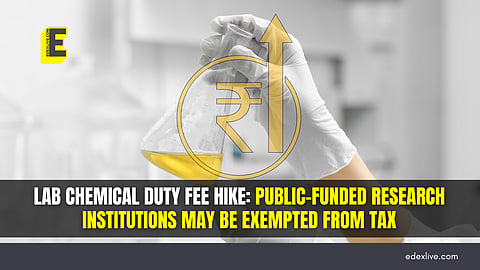

The announcement of the hike in duty rates of lab chemicals has certainly dealt a mighty blow to the scope of Research and Development (R&D) for Indian scientists and researchers.
But, a notification that resurfaced online, released by the Department of Scientific & Industrial Research (DSIR) for the Industrial R&D Promotion Programme (IRDPP), for the Public Funded Research Institutions (PFRI), stated that institutions registered against the PFRI scheme shall be able to avail custom duty exemptions on import of equipment, spares, consumables that may be used for R&D.
What does the amendment state?
As per the amendment, "Departments & laboratories of central government and state governments (other than a hospital) are not required to register with DSIR for availing the concessional customs duty exemption," it stated.
Further, it added that the total amount for the imported consignments can be cleared after the head of the institution certifies that the goods are for research purposes only.
Regional cancer centres are also eligible for DSIR registration for importing goods for research purposes at a concessional rate, the statement mentioned.
Institutes need to register with DSIR
The DSIR serves as the central department responsible for granting recognition and registration to Public Funded Research Institutions (PFRIs) such as universities, Indian Institutes of Technology (IITs), Indian Institute of Science (IISc) Bangalore, and Regional Engineering Colleges (RECs, excluding hospitals).
However, a prerequisite to avail of this concession is that the institutions should be registered with the DSIR. The heads of the institutions and organisations duly registered with the DSIR then can be eligible to certify if the goods can be exempted from the import duty.
According to another gazette notification dated January 29, 2024, institutions are informed that for those whose registrations expired on March 31, 2024, the validity of their registration has been extended until September 30, 2024. The document also outlines guidelines for institutes that may need to apply for the PFRI scheme, to utilise the concession.
While the notice brings a wave of relief for many, it might not yet be a complete solution to the problem.
Netizens say...
Users on social media platform X, question if this can be regarded as a relief, the problems that these users state are as follows:
a) Researchers in private universities with the Department of Biotechnology and Department of Science & Technology (DBT and DST) grants worth Rs 20,000 per month, can seldom afford the research expenses given the 150% hike in custom duty rates of lab chemicals, says Chetana Baliga (@Chet_Baliga)
b) Institutions whose DSIR certificate expired long ago may now have to go through rounds of compilations of research data and dispatch it in a very short period to get prior approval, this may prove to be a task for these institutes, says Sajad Parey (@professorento)
c) Prerna, a scientist, questions if one has to produce a DSIR certificate, and await approvals from the head every time one needs to order chemicals (@prernajnu)
d) Given that several public institutes do not import directly, but rather procure materials from vendors, the concession then may stand invalid, and how would it work, questions Gagandeep Gahlay (@GGahlay)
